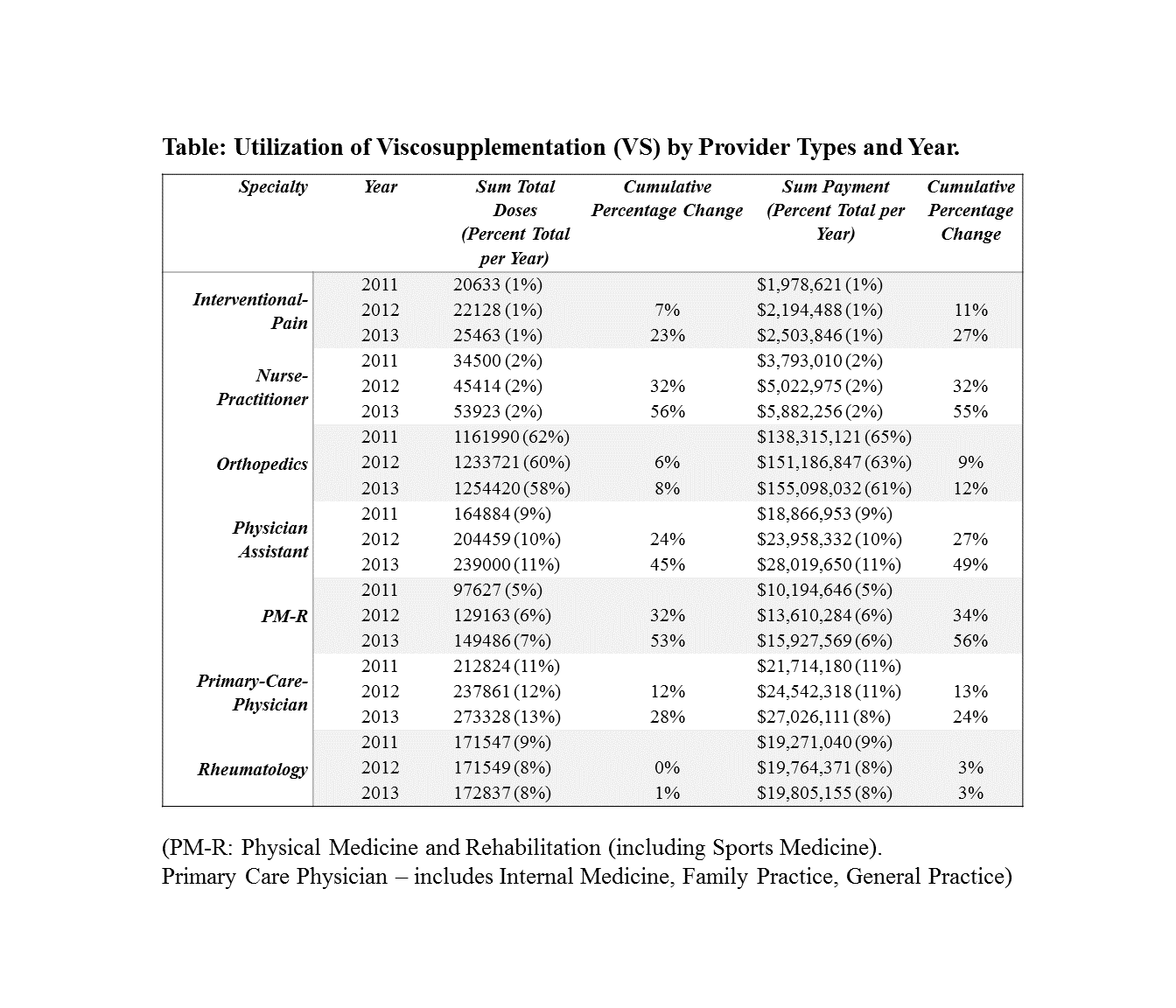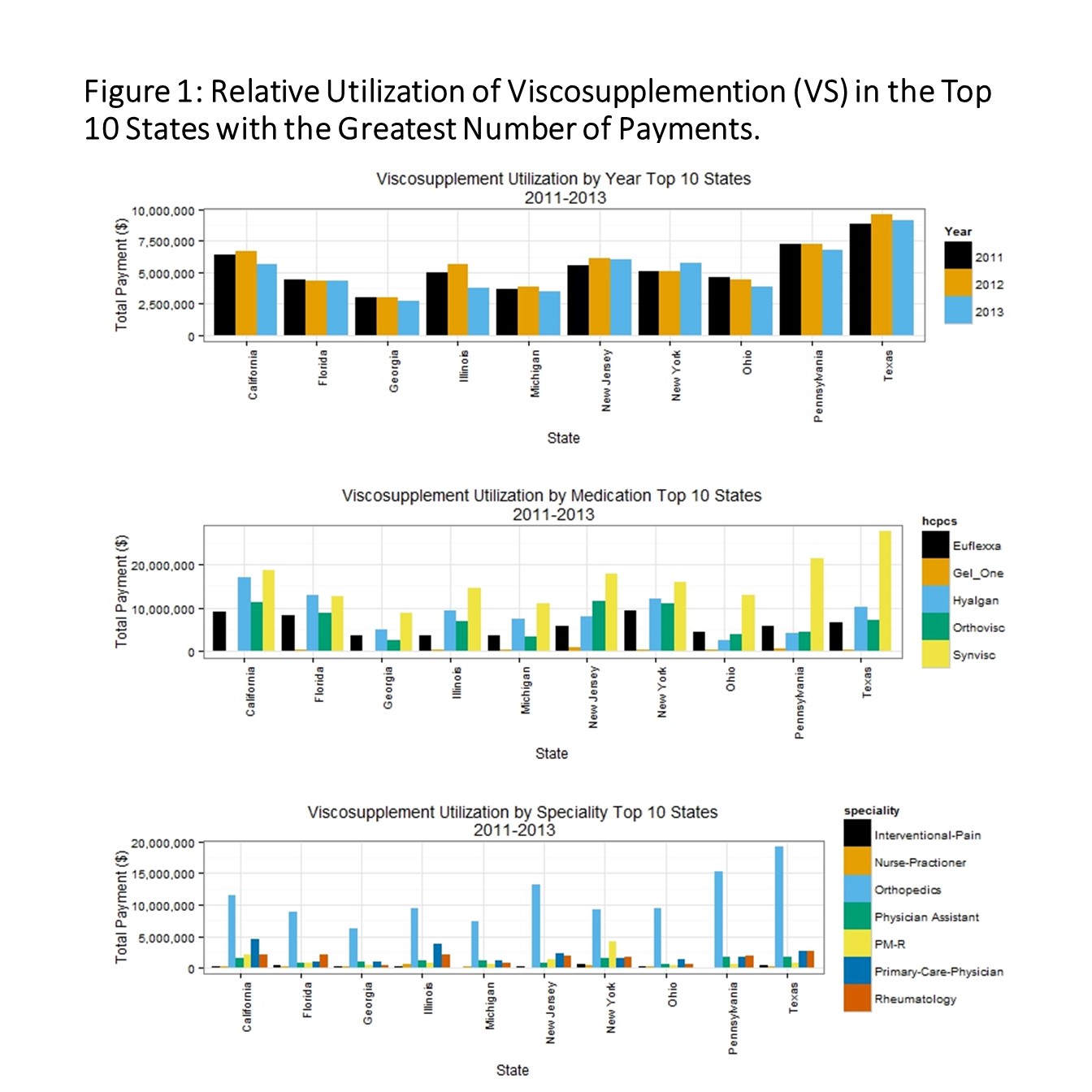Session Information
Date: Monday, November 9, 2015
Session Type: ACR Poster Session B
Session Time: 9:00AM-11:00AM
Background/Purpose:
Viscosupplementation (VS) is approved in the USA as an
option for knee osteoarthritis (OA) pain. Recent American Academy of Orthopedic
Surgeons (AAOS) guidelines have strongly recommended against use of hyaluronic acid
because of lack of clinical improvement compared with placebo. (1) OA
has a higher prevalence and impact in the elderly population necessitating use
of therapies to relieve pain and maintain mobility. Use of VS as one of the
therapies for knee OA may be an important cost driver for Medicare. Objective:
To estimate and compare the prevalence and cost of VS utilization amongst
Medicare Beneficiaries from 2011 -2013.
Methods:
A
retrospective cross-sectional analysis of Medicare (CMS) Physician Supplier
Payment Summary (PSPS) files from 2011 – 2013 was used to tabulate volume and total
payments on utilization. Non-duplicative billing claims for
five types of VS were calculated for all three years by provider
specialty and by State. Aggregated
specialties that billed the majority of the services were included
as shown in Table. Number of services submitted were
standardized to reflect unique doses (One dose of Synvisc=16mg, Synvisc One =
three doses). Descriptive summary analysis was conducted using R-Studio
(Version 0.98.1102).
Results:
Orthopedists received 63% of the VS payments from
2011-2013, and compared to 2011, the rate of growth in payments was 12% (Table).
Strikingly, there was minimal increase in utilization amongst Rheumatologists
from 2011 to 2013 whereas other provider groups showed a payment growth from 24%
– 56%. Amongst the five brands, Synvisc and Hyalgan were the most utilized.
2.1 million doses of each drug was used over the three years. Payments for
Synvisc were $322.6 million and Hyalgan $146 million. The overall payments for
VS over 3 years was $708,675,805. Utilization in the Top 10 States with the
greatest number of payments is presented in Figure 1. Orthopedists were the
dominant providers and Synvisc payments predominated in these states.
Conclusion:
This study highlights the significant cost of VS in
the Medicare population. Orthopedists and Physician assistants were the
greatest utilizers of these drugs whereas three other provider groups show
robust increases in utilization. In view of the negative recommendations by the
AAOS against the use of Hyaluronic acid joint injections, the current
trajectory of use of Hyaluronic acid may not represent optimal value care.
References:
1. AAOS
Guideline: Treatment of Knee Osteoarthritis. http://wwwaaosorg/Research/guidelines/TreatmentofOsteoarthritisoftheKneeGuidelinepdf.
To cite this abstract in AMA style:
Kaeley GS, Thway M, Dodani S. Utilization of Viscosupplementation: 2011 – 2013 [abstract]. Arthritis Rheumatol. 2015; 67 (suppl 10). https://acrabstracts.org/abstract/utilization-of-viscosupplementation-2011-2013/. Accessed .« Back to 2015 ACR/ARHP Annual Meeting
ACR Meeting Abstracts - https://acrabstracts.org/abstract/utilization-of-viscosupplementation-2011-2013/


